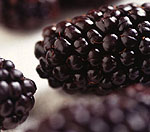Blackberry Herb: Benefits and Uses

Blackberry is a trailing, semi-evergreen, prickly perennial growing to around 12 ft. The slender branches feature sharp prickles, and the leaves are finely hairy with three to five leaflets. The white, five-petaled flowers appear from mid-summer to fall, followed by the juicy black fruit that can be picked to make delicious pies, wine, brandy, and cordial. But all parts of the plant are useful (leaves, stem, and roots), and have a well-known and documented history as herbal remedies.
The root-bark and the leaves of blackberry are astringent, depurative, diuretic, tonic and vulnerary. They make an excellent alternative medicine for dysentery, diarrhea, hemorrhoids, and cystitis.
The presence of large amounts of tannins that give blackberry roots and leaves an astringent effect useful for treating diarrhea are also helpful for soothing sore throats. A decoction of the leaves is useful as a gargle in treating thrush and also makes a good general mouthwash. The chewing of the leaves for bleeding gums goes back 2,000 years.
A medicinal syrup is also made from blackberry, using the fruit and root-bark in honey for a cough remedy.
Blackberry tea is most easily made with the leaves and/or fruit, and is useful when applied externally as a lotion, and may be of help in the treatment of psoriasis, and other scaly conditions of the skin.
Caution: It is not advisable to take blackberry preparations for more than a week at a time.
|